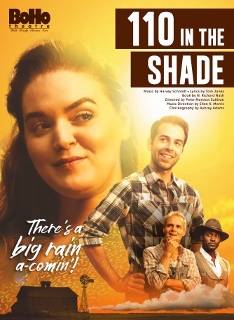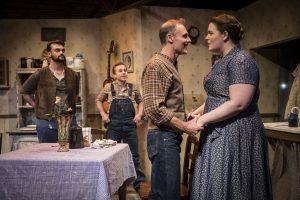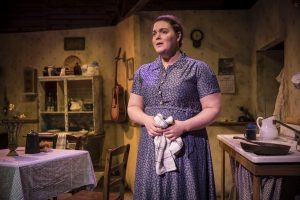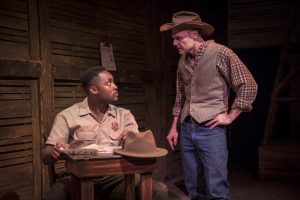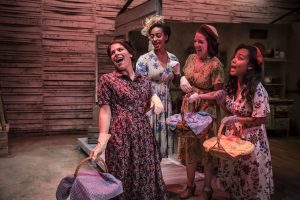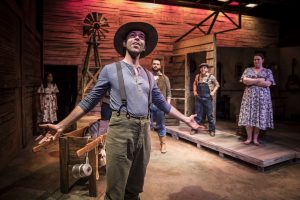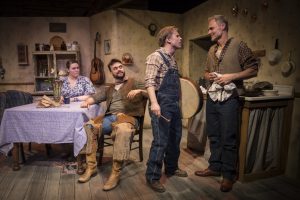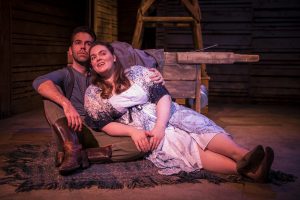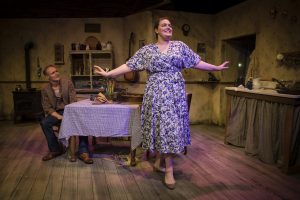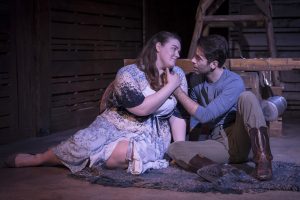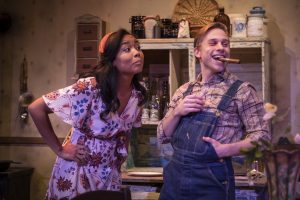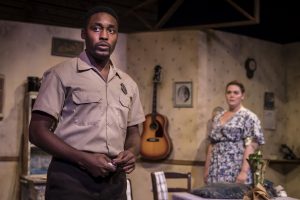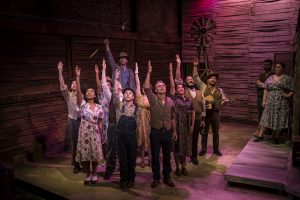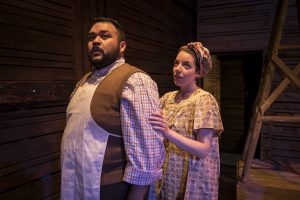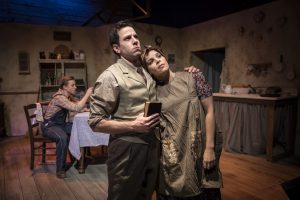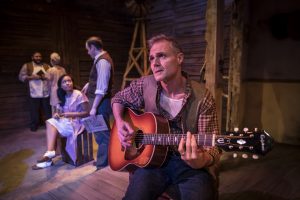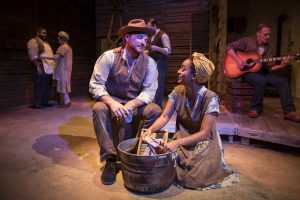A SHOW TO END ANY THEATER DROUGHT
It’s a “big sky” story with a ton of heart, this other musical created by Harvey Schmidt and Tom Jones, composer and lyricist of The Fantasticks and I Do! I Do! Wonderfully revived by BoHo Theatre at Theater Wit, 110 in the Shade deserves packed audiences for a sweet show steeped in down-home decency and wise in the lore of love.
A Tennessee Williams-style tale of sexual frustration and ardent longing, faithful to N. Richard Nash’s 1954 hit The Rainmaker, this very moving musical spins the vintage saga of Lizzie Curry. She’s a lonely woman mired on a drought-ravaged homestead, itself trapped in the Dust Bowl of the Depression, with no more future than past. Something’s got to give.
Good in a hundred ways, Peter Marston Sullivan’s warmly winning and coyly intimate revival boasts the most convincing performances that perfect casting and a Midas touch can inspire. Complete with windmill and barnyard backdrop, set designer Patrick Ham’s hardscrabble set instantly evokes Walker Evans’ famous photos of rural poverty.
So much happens from dawn to midnight on this seemingly ordinary but special summer day — and how much we want to believe it! Lizzie’s plight as a small-town spinster verging on old maidenhood is familiar stuff (think Laura Wingfield), as are her over protective or haplessly ineffectual brothers and wisely patient father.
The prairie-blossom plot unfurls when a self-proclaimed dowser and rainmaker (a flimflam artist anticipating Professor Harold Hill) promises the southwestern town of Three Point, Texas, relief from famine. For $100, Bill Starbuck promises to make the heaven dump a deluge. Intentionally or not, this drifting dreamer also brings an emotional downpour to a late-budding lady in the form of long-lost love. (There are, after all, all kinds of drought.) This human catalyst who incarnates charisma is the gentleman caller who opens up Lizzie to the prospect of love, just as rain strikes life from seemingly dead roots. Along the way, he will show Lizzie how she’s beautiful. He encourages her to dream while suggesting he is the hero of her story in “Melisande.” For plenty of good reasons, Lizzie fights not to fall for any fantasy, her own or this necromancer’s.
Nash delivers the kind of emotionally accessible, passionately generous plot that you can walk around in, seeing everything and everyone from all sides. We feel how the brothers are torn between wanting to match-make Lizzie (whose first and last kiss happened when she was 12) and striving to keep false hopes from hurting her. She’s safer on the ranch, replacing a mother who’s never mentioned. We equally sense Lizzie’s ardor to be loved by a stranger as much as by kin.
Will Lizzie go beyond her “You’re Not Foolin’ Me” resistance to stake her future on a dreamer? Is she now “woke” to the love she denied herself till an itinerant con artist made her bloom and to the “Wonderful Music” you only hear when you listen to love?
Affectionately enlarging this very compassionate story, Schmidt’s all-American score richly evokes Aaron Copland and Frank Loesser and, in the jazzy “The Rain Song,” even Gershwin. Director Sullivan and choreographer Aubrey Adams turn the show’s silver into gold and gold into bullion through wizard timing, trenchant performances and unpretentious dances.
With many of the lyrics taken directly from Nash’s play, the seventeen songs of this super-supportive score, charmingly shaped by music director Ellen K. Morris, serve the story at every turn, evoking corn-pone conniptions in “Poker Polka,” country pleasures in “Everything Beautiful Happens at Night,” and the scorched sameness of “Another Hot Day.”
Billy Dawson’s tough-loving brother Noah (who wrongly urges “plain” Lizzie to accept a childless destiny and remain a homebody) contrasts with ebullient Christopher Ratliff’s goofy kid brother, Jimmy: Both mean well no matter what.
Peter Robel is solid as a silo as the good-hearted dad, Denzel Tsopnang salt-of-the-earth sensitive as divorced Sheriff File hoping for his first second chance, and Mariah Copeland is a veritable dust devil as Snookie, Jimmy’s Ado Annie-like girlfriend — packed with frontier fun, her “Little Red Hat” duet with Jimmy is both cunningly salacious and perfectly innocent.
The seven-person ensemble — Elissa Newcorn, Dan Gold, Laz Estrada, Emily Senkowsky, Max Kramer, Sana Selemon, and Parker Guidry — conjure up a town (“The Hungry Men”) the way Meredith Willson’s Iowa-stubborn River City citizens served The Music Man.
But the industrial-strength triumph belongs to slyly smiling Tommy Thurston as a contagiously visionary Starbuck and a Rubenesque, powerfully persuasive Neala Barron as fallow-then-fertile, soon-to-be-radiant Lizzie (“Is It Really Me?”). His “Evenin’ Star” and her “Simple Little Things” and anguished “Old Maid” testify to all the bedrock basics from which beauty gets built. Forget Burt Lancaster and Katharine Hepburn in the famous film. Nobody told these actors they weren’t creating these parts from the start, so they did.
photos by Liz Lauren
110 in the Shade
BoHo Theatre
Theater Wit, 1229 W Belmont Ave
Thurs-Sat at 8; Sun at 2 (dark Nov. 22)
ends on December 16, 2018
for tickets, call 773.327.5252 or visit BoHo Theatre
for more shows, visit Theatre in Chicago
